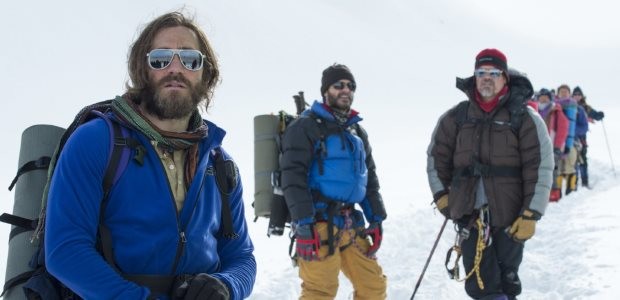Everest confronts the real dangers of mountaineering head on. It is a skilfully made film about a real life expedition to the summit that went wrong because of bad weather but also perhaps due to human folly, though in trying to overreach and cover the events that unfold from many angles, the narrative greatly suffers.
With an impressive cast and remarkably staged visuals, which owe a great deal to director Baltasar Kormákur’s daring decision to shoot some (though not all) of the action on location in Nepal itself, the film feels immediately immersive. Seen on an IMAX screen (the film was not shot in that medium) the sheer scale of the climb that awaits the men and women who take on the daunting task seems suitably herculean while the looming peaks are both breathtakingly majestic and also a portent of the tragedy that awaits some of them. This is the films single biggest accomplishment, its transportive power. The intimate, tightly framed visuals puts an immediacy to the ascent and when disaster strikes, in the form of ominous black clouds that bring rain, thunder and ice with all of nature’s blind fury along with avalanches and falling rocks, we feel entrapped.
The film however suffers from an over abundance of characters without letting any one of them fully develop into a single coherent focal point that we can use as reference. From its very first scene, where we are introduced to Rob Hall (Jason Clarke) and the team that he leads on the expedition to base camp and onwards to Jake Gyllenhaal’s maverick Scott Fischer and company, there are so many people coming along for the ride that the film seems to lose track of some of them. One minute we see a group from South Africa with their own agenda, next they’ve completely disappeared from the plot. There also isn’t a single person you can root for because you don’t know whom the film wants you to get behind. It’s unsure of itself and this comes across the screen as spotty storytelling. If all of this were not enough, you have the problem of the wives (Keira Knightley and always weepy Robin Wright) who really only exist as faces at the end of a phone line to provide added drama and motivation for the characters of Clarke and Josh Brolin to want to return back alive to.
Simon Beaufoy and William Nicholson’s script tries too hard to explain the motivation of why these climbers put themselves in such peril but all the rationalizing and campfire talk only distracts. Kevin Macdonald’s masterful, peerless Touching the Void, the single best film ever made about mountain climbing, never ever attempted this yet is as gripping and incredible as any film can be. Everest in contrast feels tragic but never incredible; spectacular but lacking in the kind of raw human emotions that we find ourselves drawn towards. This kind of epic filmmaking and grand storytelling should envelope us completely but Everest falls short of this promise. In trying to be tragic and thrilling it ends up not being much of either.
Rating: 




